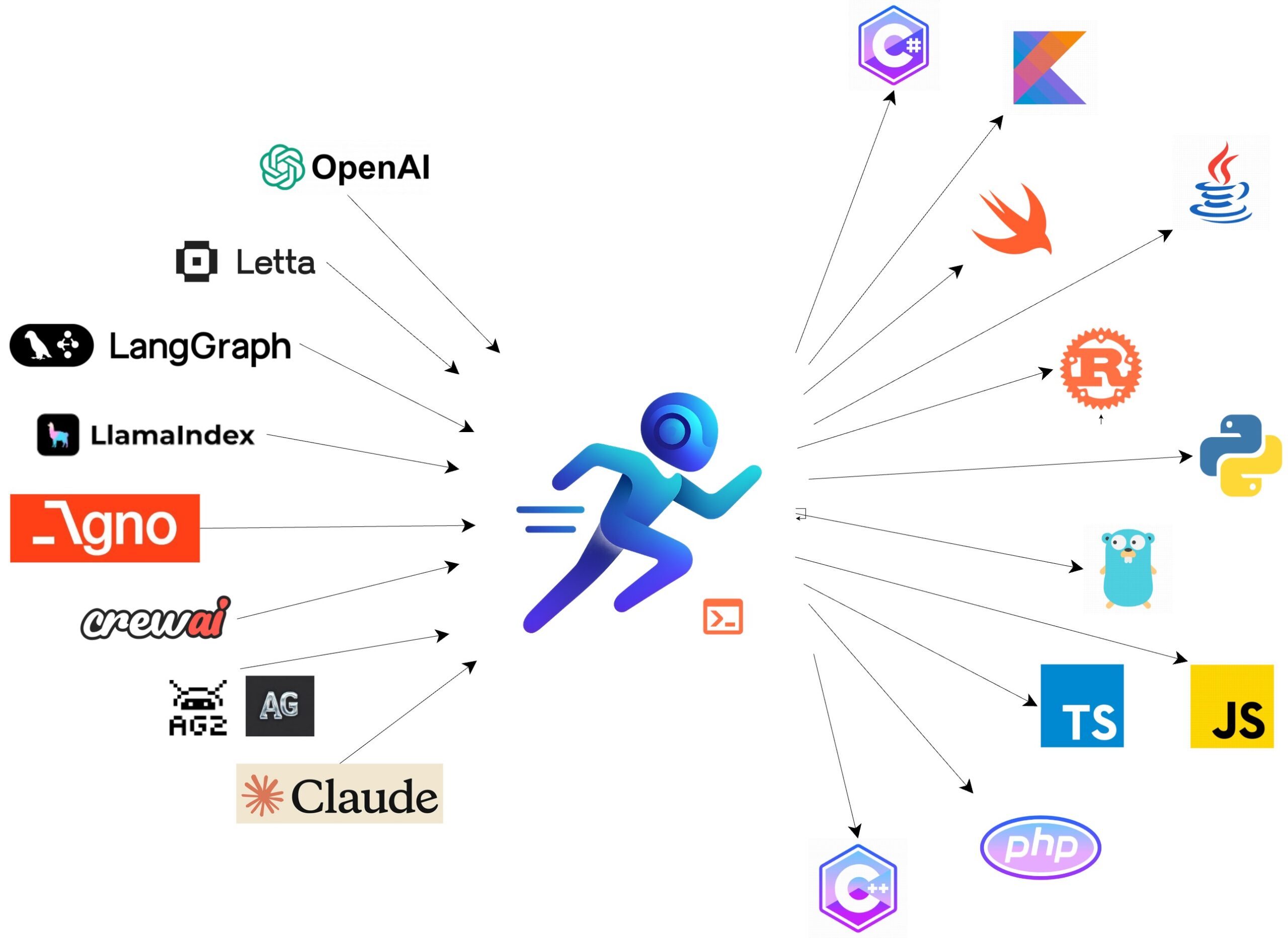RunAgent is an open source tool designed to help developers more easily develop and deploy AI agents. It supports writing AI agents in Python and breaks down language barriers by enabling cross-language calls through multi-language SDKs (e.g., JavaScript, Rust, Go, etc.). Developers can use the full-featured development environment locally or deploy to the upcoming serverless cloud platform. runAgent provides a powerful command line interface (CLI) and automated deployment capabilities for a wide range of scenarios from prototyping to large-scale production environments. Its framework-agnostic nature allows developers to freely choose LangChain, CrewAI and other frameworks to simplify the development process.

Function List
- Support for writing AI agents in Python, enabling cross-language calls via multi-language SDKs (e.g., JavaScript, Rust, Go).
- Provides a local development server that includes hot reloading and real-time debugging capabilities.
- Serverless cloud platform that supports one-click deployment to production environments (coming soon).
- Built-in streaming response and complex workflow management for multi-step AI agent tasks.
- Provide framework-independent templates, support LangChain, CrewAI and other mainstream AI frameworks.
- Includes real-time logging, monitoring and debugging tools to enhance development efficiency.
- Webhook support for event-driven architectures.
Using Help
Installation process
Installation of RunAgent is very simple and is done mainly through the command line instrumentation (CLI). The following are the detailed installation steps:
- Installing the CLI
Make sure you have Python 3.8 or above installed on your system. Open a terminal and run the following command to install the RunAgent CLI:pip install runagentAfter the installation is complete, you can verify that the installation was successful by using the following command:
runagent --version - Initialization Project
In your working directory, run the following command to create a new RunAgent project:runagent init <project_name>This generates a file containing the
runagent.config.jsonproject directory, which defines the agent's entry point and other configurations. - Starting the Local Development Server
Go to the project directory and run the following command to start the local FastAPI server:runagent serve <project_dir>When the server starts, it runs by default on the
http://localhost:8000, supports hot reloading, developers can debug code in real time. - Deployment to the cloud (coming soon)
RunAgent offers one-click deployment with future support for serverless cloud platforms. Run the following command to deploy:runagent deploy <project_dir>After deployment, the system returns
agent_id或host:portfor cross-language SDK calls.
Using the main functions
The core function of RunAgent is to simplify the development and deployment of AI agents. Below is a detailed how-to of the main features:
- Writing AI Agents
In the project directory, write the AI agent logic in Python. runAgent supports a variety of frameworks, such as LangChain or CrewAI. you can find more information about the AI agent logic in therunagent.config.jsonDefine the entry point of the proxy in the Example:{ "entrypoints": { "main": "main.py:run_agent" } }在
main.pyWrite the agent logic in the RunAgent, and the RunAgent will automatically recognize and load it. - cross-language call
RunAgent provides multi-language SDKs for Python, JavaScript, Rust, and Go. Install the SDK for the corresponding language, such as the Python SDK:pip install runagent-clientUse the SDK to call the agent. For example, in Python:
from runagent_client import RunAgentClient client = RunAgentClient(agent_id="your_agent_id") result = client.call("main", input_data={"query": "Hello"}) print(result)The SDK handles the complex communication logic and developers simply use it as if they were calling a native function.
- Streaming Response
RunAgent supports streaming responses and is suitable for processing real-time data or long tasks. Asynchronous client using the SDK:async def main(): async for response in client.stream("main", {"query": "Stream data"}): print(response)This is useful for applications that require real-time updates, such as chatbots.
- Debugging and Monitoring
RunAgent's local server has built-in logging and monitoring tools. After starting the server, access thehttp://localhost:8000/docsView API documentation and real-time logs. Developers can use the logs to analyze the running state of the agent and quickly locate problems. - Webhook Support
RunAgent supports an event-driven architecture and can be configured with a webhook to trigger the agent. For example, in therunagent.config.jsonAdd a webhook endpoint to the{ "webhooks": { "event_name": "http://your-server/webhook" } }When an event is triggered, RunAgent will automatically invoke the corresponding agent logic.
Featured Function Operation
- framework independence
RunAgent does not limit developers to a specific framework. You can choose LangChain, CrewAI or a custom framework. Templates can be used when initializing a project:runagent init <project_name> --template langchainThis generates a LangChain-based project structure with sample code.
- One-Click Deployment
Deploying to the cloud is simply a matter of runningrunagent deploy. The system automatically handles environment configuration, dependency packaging and load balancing (available after the cloud platform goes live). Local development and cloud deployment are seamless, and developers don't need to manually tweak their code. - real time debugging
The local server supports hot reloading, no need to restart after modifying the code. Logging tools will record each call of the agent , including input and output and performance indicators , so that developers can easily optimize the code .
application scenario
- Rapid Prototyping
Developers can quickly build AI agent prototypes locally and debug them using RunAgent's local server. Ideal for startups or individual developers to validate ideas. - Cross-Language Project Integration
In projects with a multi-language technology stack, RunAgent allows AI agents written in Python to be called directly from the front-end (JavaScript), back-end (Go), or embedded systems (Rust), simplifying the integration process. - Production environment deployment
RunAgent's serverless cloud platform (coming soon) supports auto-scaling for business applications that need to handle highly concurrent requests, such as intelligent customer service or recommendation systems. - event-driven application
With webhook support, RunAgent can be used in real-time data processing scenarios, such as triggering an AI agent to analyze inventory when a new order is received.
QA
- What languages does RunAgent support?
Python, JavaScript, Rust and Go are currently supported, with more languages to be added in the future. Developers can submit requests or contribute code via GitHub. [](https://github.com/runagent-dev/runagent) - How to debug a locally developed AI agent?
After starting the local server, access thehttp://localhost:8000/docsView logs and API documentation. The logs show detailed information about each call. - Is the cloud deployment already available?
Cloud deployment capabilities are not yet live, but local development and self-hosting are fully available. The cloud platform is expected to offer one-click deployment and auto-scaling. [](https://github.com/runagent-dev/runagent) - Does RunAgent require a specific AI framework?
Not required.RunAgent supports any Python framework such as LangChain, CrewAI or custom code.





































